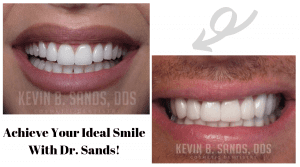Dental implants are an excellent solution for teeth that are cracked, deteriorated, and unhealthy. They can effectively help an individual achieve a healthy, beautiful smile and prevent future dental issues.

Dental implants are designed to function like your natural teeth, and just like your teeth, they are subject to gum disease or “peri-implantitis” (the destructive inflammatory process that will affect the soft and hard tissues surrounding dental implants).
The main difference between natural teeth and implants is that the portion of the implant that lies beneath the gum line consists of titanium instead of a natural root.
To properly care for your teeth and dental implants, please follow these tips:
At-Home Care
Dental implants are just as susceptible to infection as natural teeth because the area between the implanted tooth and the gum traps food and bacteria. Therefore, the best way to remove it is with regular flossing and brushing twice a day.
Pay special attention to cleaning your back teeth and removing food particles from in between your teeth.
You should avoid regularly using abrasive or harsh treatments and rinsing with acidic fluoride washes. These substances can break down the protective materials on the implant.
Can Dental Implants Get Stained?
Although there are whitening agents that can safely be used on dental implants, they are like natural teeth in that they can also become stained. Be sure to watch your coffee and tea intake, and brush thoroughly after you drink either of these. Smoking can also stain dental implants.
An electric toothbrush may be more helpful than a regular toothbrush for keeping your teeth clean because the vibration can better remove plaque below the gumline. Mouthwash or salt water is also highly recommended for eliminating bacteria on implants.
The main concern is being careful not to scratch the titanium surface of the implant that is below the gum line, as this can sometimes cause the implant to fail.
If you already have concerns about the color of your implants, we suggest visiting your dentist to learn about brightening options. Bonding materials and professional polishes are other options for correcting implant discoloration.
At the Dentist
Regular dental cleanings and checkups are important for the health of your teeth and implants. Having your teeth cleaned at least twice a year is vital to your oral health, and sometimes more frequent visits are recommended depending on your needs. You may require X-rays every year to check the bone around the implants and ensure everything is healthy.
Maintaining Overall Healthy Gums, Teeth, and Implants
Good oral hygiene is essential to a beautiful smile. Brushing and flossing every day, at least twice a day, removes most of the plaque and bacteria buildup that causes tooth and dental implant issues.
Although flossing may seem like a simple thing to do, many people skip flossing when brushing their teeth.
Patients often visit our practice in Beverly Hills and ask Dr. Sands for ways to improve their oral hygiene, only to be told to brush and floss at least two times a day. You can greatly improve your smile with daily flossing!
If you are brushing your teeth without flossing, there are food particles, sugar, and other cavity causing elements left behind. These damaging components are removed better with floss, leaving your teeth clean and reducing bacteria and harmful particles in your mouth.

Effective Flossing
Not sure if you’re flossing properly? Follow this technique for optimal efficiency:
- Choose a type of dental floss that you like.
- Tear off 18 inches of floss.
- Wrap the ends of the floss around either your middle or index finger on each hand.
- Grip the floss tightly between your thumb and finger.
- Gently insert the dental floss between your teeth. Be careful not to snap the floss, or you could damage your gums.
- Move the floss gently back and forth against the tooth on both sides and underneath the gum line. Repeat this process in between all of the upper and lower teeth.
- Be sure to floss against the backside of a tooth even if there is no tooth behind it.
- If for any reason you cannot use traditional floss, there are devices that can be used as alternatives, such as dental flossers, vibrating flossers that massage the gums, or interdental cleaners. Although these can cost more than conventional floss, flossing is an essential step in your daily routine that should not be skipped.
Regardless of the type of floss you choose, be sure to use it daily to significantly reduce your risk of gum disease, tooth decay, and other oral hygiene problems. Proper brushing and flossing can also prolong the life of your dental implants and natural teeth!
Please contact our cosmetic dentistry practice in Beverly Hills by calling (310) 273-0111. Our team is happy to schedule an appointment with Dr. Sands, where you can further discuss how to keep your dental implants healthy and clean. You can also fill out our online contact form to get in touch.